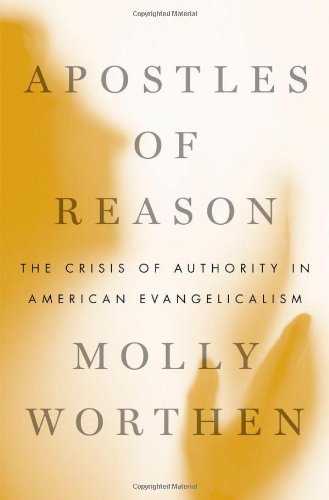 The first part of Molly Worthen’s assessment of American evangelicalism (Apostles of Reason: The Crisis of Authority in American Evangelicalism
The first part of Molly Worthen’s assessment of American evangelicalism (Apostles of Reason: The Crisis of Authority in American Evangelicalism) is a nearly 100-page section on inerrancy entitled “Knights Inerrant.”
As with any work of this type that tries to lay out an issue with some patience and detail, it is difficult to lift out some representative quotes.
But I did it anyway.
Hopefully these will give you some taste for this portion of the book–though to assess the book itself, you have to read it (duh).
“[Second generation fundamentalists] aspired to the intellectual sophistication of old [19th century] Princeton, but it was not clear whether nuance was compatible with their sense of mission. Inerrantist intellectuals considered themselves something like Protestant Marines, a warrior corps whose confidence in the authority of scripture–and commitment to taking the principle of God’s sovereignty to its logical extreme–anointed them as the Bible’s first shock troops, favorite sons, and truest defenders” (24).
“From the neo-evangelical point of view, if Christian civilization was to survive the twentieth century, then biblical inerrancy and a reenergized Christian Weltanschauung [worldview] must form its bedrock…. [Despite Pietistic influence] a more rationalist, Reformed school of thought dominated their training. In this tradition, there was a single proof that one’s presuppositions were the right ones, and one acceptable defense for any intellectual position: It was a true reading of the inerrant gospel” (35).
“In their call for engagement with the wider culture, for intellectual curiosity and rigor, the cadre of ex-fundamentalists at the center of the neo-evangelical movement tapped into a real sentiment simmering among Protestants. Yet for all the broadminded engagement that they encouraged in theory, their institutions waved the banner of biblical inerrancy without coming to terms with the controversy surrounding the doctrine” (53).
“[The neo-evangelical] ahistorical view of scripture, their overriding desire to defend the doctrine of inerrancy as ancient, immutable, and God-given, made sensitive scholarship impossible” (71).
“[P]resuppositionalists’ basic proposition, which they readily admitted–God is perfect and incapable of error in his revelation, and therefore no human may contradict that revelation–committed them [ironically] to a highly rationalistic view of the Bible. Since God could never err, any apparent discrepancy between scripture and scientific knowledge revealed not a mistake in revelation or a rupture between faith and reason, but merely the error of human interpretation” (87).
